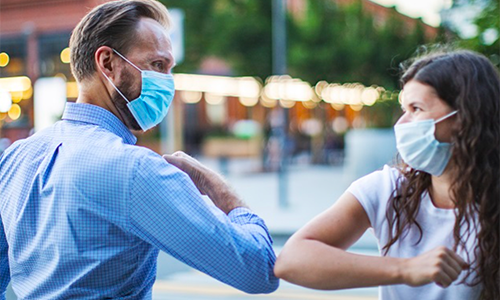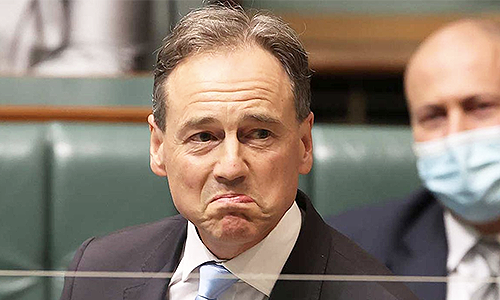
by FRED PAWLE – THE orgy of nostalgia for the glory days of COVID – five years ago this month – confirms that most journalists and their “expert” friends still don’t understand life outside their own bubble.
Whenever the mainstream media marks the anniversary of a historic event, it usually uses the benefit of hindsight to embellish whatever was hastily reported at the time with a more comprehensive, nuanced perspective.
- The facts about COVID don’t lie.
- The average age of COVID deaths is about 83.
- This virus was not a threat to the rest of us.
Not so the fifth anniversary of the WHO declaring a COVID “pandemic” in March 2020, which this weekend triggered an orgy of nauseating nostalgia.
You can understand why. COVID was exactly the sort of crisis that the mainstream media traditionally specialised in, a supposedly unprecedented set of circumstances that demanded the populace be kept constantly updated in order to survive it.
MISPLACED
We now know this was not true – and that our faith in the media was, to put it mildly, misplaced.
So if journalists were inclined towards nostalgic recollections about the start of the COVID era this weekend, it was because they wanted to reminisce about the last time – possibly the final time – people trusted them.
And what a time it was! Journalists were so influential then!
“I tried to help people lead full, cultured lives from their living rooms,” Melissa Kirsch recalled through rose-coloured glasses in The New York Times.
“It was a project intended to help people find distraction, comfort, meaning, joy, sense, commiseration and community in the midst of what felt at times like intolerable uncertainty.”
If you are tolerating uncertainty rather than fighting against it, you’re doing journalism wrong.
“I loved beavering away at my work at home, my day punctuated by walks up the street to get a takeaway coffee,” Helen Trinca reminisced in The Australian newspaper.
“With theatres and the pub closed, entertainment was beamed remotely to our front rooms – access many disabled people had long dreamed of,” rejoiced The Guardian’s disability reporter Frances Ryan.
Spread amidst this nostalgia were occasional headlines that at first glance seemed to announce some sort of reflection and reassessment.
These headlines included: “Britons among hardest hit by COVID fallout” in The Guardian, “The economic impact of COVID lingers” on MSN and “Day of reflection” by Sky News in Britain.
But these too fell disappointingly short.
Rather than admitting that the lockdowns and vaccines were an incalculably expensive and destructive response to an obviously mostly harmless flu, they were simply faking sympathy for the people who died alone during the lockdowns. They also blithely reminded us that the debt our governments incurred was larger than usual.
Warming to its task, the media then took the opportunity to remind us that another pandemic is due any day now and this time our relationship to the system is not as robust as it once was.
“If we are to have any hope of an effective pandemic response next time, we must plan how to strike the balance between protecting the vulnerable yet maintaining a sense of community and connection,” former Australian Medical Association president Steve Robson said in The Australian last week.
“That will not be easy and can only be built on a foundation of trust.”
EASIER
On the contrary, old son, our response next time will be infinitely easier. All we need to do is not believe a thing the political, media and medical establishment tells us – and simply get on with our lives instead.
If the last pandemic taught us anything, it is that trusting experts during a time of concocted crisis is as useful as interior decorating advice from Stevie Wonder.
There are two ways to confirm this. Firstly, the facts about COVID don’t lie. Despite the medical authorities’ best efforts to skew the results, the average age of Covid deaths in Australia (and the rest of the world) is about 83. This virus was not a threat to the rest of us.
But the “experts” nevertheless imposed upon our nation a mental health crisis caused by isolation; stunted the development of an entire generation of kids by shutting them out of schools; forced loving families apart while locking dysfunctional/violent families up together; blew trillions of dollars in compensation for the inconvenience of staying home; and caused the closure of countless small businesses while the rich got richer.
Oh, and the 20,000 or so excess deaths in Australia that coincided with the rollout of the vaccines has still not been explained, and likely never will, at least by the authorities.
The lack of curiosity about these deaths from the medical establishment leads us to inevitably conclude that these 20,000 people were killed by the “safe and effective” vaccines.
The other way to look at COVID’s effect on “trust” is as a continuation of the decline of “experts”.
When Albert Einstein became a media celebrity for discovering the theory of relativity in the early 20th Century, it represented a new high point in the mass acceptance (and adulation) of “experts”.
Einstein’s successors have been mostly disappointing us ever since.
The diminution of their authority accelerated in 2009, when the hacking of emails from the Climate Research Unit at the University of East Anglia in 2009 revealed some of the world’s leading climate scientists had tried to “hide the decline” in a set of temperature records to achieve a dubious and preconceived outcome from their “research”.
Experts are now more preoccupied with establishing and defending their authority than they are with conducting any legitimate research that might be of use to the rest of us.
This is amusing enough, but becomes doubly comical when pseudo-findings are applied to a pseudo discipline, like “human rights”.
Last week the Australian Human Rights Commission released its Collateral Damage report which declared with unintended irony that “human rights were not always considered or protected” during the COVID response.
The very organisation whose only job is to safeguard human rights looked away while those rights were violated on a scale and severity unprecedented in our peacetime history.
DEFENCE
“It’s not for me to tell them how to do their job, but I fancy the ideal time to be bold in defence of our human rights might have been when they were under attack,” Steve Waterson helpfully opined, in his characteristically restrained manner, in one of the few admirable and honest COVID retrospectives published in The Weekend Australian.
If any group has obnoxiously failed to learn the lessons of COVID, it’s the authorities.
There are abundant signs that those same authorities have recently received their orders to press the button on Covid 2.0.
This could come in the form of another medical emergency. Or it could be based on the supposed fight for “freedom” in Ukraine.
It is curious, to say the least, that the same people who so cruelly and pointlessly discarded our freedoms during COVID have suddenly decided that no price is too high in defence of “freedom” in Ukraine.
Will it work? My guess is that their assessment of COVID is distorted by their own recollections of how novel and even fun it was for them.
They have conveniently forgotten how much devastation and trauma it caused outside their own bubble, and are dangerously assuming that the rest of us remain as naively compliant as we were five years ago.PC













I’m still waiting to learn who and why banned ivermectin. The wonder drug really works. It didn’t happen by itself.
Were the ‘health authorities’ running cover for the major pharmaceutical companies.
So many mysteries, so many lies.